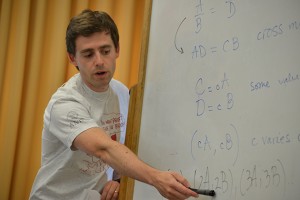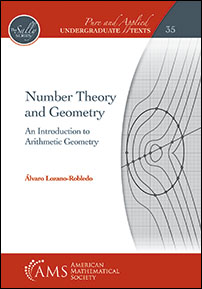Navigation:
- Description of the course: MATH 3240
- Instructor Information: Álvaro Lozano-Robledo
- Resources: books, handouts, notes, and links to other resources
- Homework: problems and solutions
- Exams: information about exams and grading for the class
- Schedule: a summary of what was covered when, day by day
- Policy Statements
Description:
Number theory is the study of the integers, but this description hardly conveys the beauty of this part of mathematics. One of the main goals of this course is pedagogical: to see that mathematics is a vibrant intellectual activity and not a set of fixed rules developed by some higher authority. This viewpoint is especially useful for future teachers. Students will carry out many numerical experiments, generate conjectures based on patterns observed, and then prove or disprove these conjectures.
The content focuses on those parts of classical number theory which still have modern relevance in the subject: the Euclidean algorithm, modular arithmetic, distribution of primes, diophantine equations, applications to cryptography, arithmetic in quadratic rings and polynomial rings, and quadratic reciprocity. The examples in this course will provide a lot of food for thought for anyone who later takes abstract algebra.
Prerequisites: A grade of C or better in MATH 2142 or 2710.
Credits: 3
Meets: Mondays, Wednesdays, and Fridays, 2:30-3:20pm, at AUST 202.
Instructor: Álvaro Lozano-Robledo

Website: http://alozano.clas.uconn.edu/
Office Hours: Mondays 10-11am (in-person), Thursdays 1-2pm (online — link was sent by email), or by appointment.
Office: Monteith 233.
I’m a professor of mathematics, and the Director of Undergraduate Studies at the University of Connecticut. The focus of my research is in number theory, and more concretely in the study of elliptic curves, and other abelian varieties.
Resources:
 The book for the course is Number Theory and Geometry: An Introduction to Arithmetic Geometry (AMS.org), (Amazon.com).
The book for the course is Number Theory and Geometry: An Introduction to Arithmetic Geometry (AMS.org), (Amazon.com).
The book is freely available here!
There are many excellent books on “elementary number theory”, so the student is strongly encouraged to read through some of these as well. Here are some recommendations:
-
- An Illustrated Theory of Numbers, AMS, Martin H. Weissman.
- Elementary Number Theory, Second Edition (Dover Books on Mathematics), by Underwood Dudley.
- Elementary Number Theory and its Applications. 6th Ed., Pearson, by Kenneth H. Rosen.
- The Theory of Numbers: A text and source book of problems, by A. Adler, J. E. Coury.
- Elementary Number Theory: Primes, Congruences and Secrets, Springer.
(Freely available at http://wstein.org/ent/ent.pdf ) by William Stein. - A Friendly Introduction to Number Theory, Pearson, by Joseph H. Silverman.
- An Introduction to the Theory of Numbers, Oxford Science Publications, by G. H. Hardy and E. M. Wright.
- Elliptic Curves: Number Theory and Cryptography, Second Edition, Discrete Mathematics and its Applications, CRC Press, by L. C. Washington.
Homework problems and solutions:
Most of what you learn in this course will be the result of working exercises that are designed to reinforce key concepts, develop skills, and test your understanding of the material. There will be textbook exercises due at the end of every other week on lecture material. Some of the exercises are straightforward, others are very complex. In general homework is due every other Wednesday.
Late homework will not be accepted. Although it should be done daily, it will only be collected once every other week, on Fridays, in class or in my office (MONT 233) *before* 4:00PM. The first assignment is due on Friday 1/27.
You are encouraged to talk with your classmates about the homework. If you have difficulties, do not waste time — get help! Please come to office hours!
Homework assignments:
-
- Homework 1 – due Friday 1/27. (TeX source) — Solutions.
- Homework 2 – due Friday 2/10. (TeX source) — Solutions.
- Homework 3 – due Monday 2/27. (TeX source) — Solutions.
- Homework 4 – due Friday 3/10. (TeX source) — Solutions.
- Homework 5 – due Monday 4/3. (TeX source) — Solutions.
- Homework 6 – due Monday 4/17. (TeX source) — Solutions.
- Homework 7 – due Friday 4/28. (TeX source) — Solutions.
Information about exams and grading for your class:
Your grade in the course will be determined by your performance on the two midterm exams, a final exam, and your lecture grade. The lecture grade consists primarily of homework and class participation. Your entire grade is out of 550 points (see below):
Here you will find information about midterms and exams.
-
- FIRST EXAM: Friday, March 3rd, in-class.
- Highlights of Chapter 1-4.
- Practice problems for Midterm 1.
- Solutions and hints.
- Solutions to first midterm (were sent by email).
- SECOND EXAM: Friday, April 14th, in-class.
- Highlights of Chapters 4,5,7,8.
- Practice problems for Midterm 2.
- Solutions and hints.
- Solutions to second midterm (were sent by email).
- FINAL EXAM: Monday, May 1, 10:30 – 12:30, AUST 202. (Check the final schedule here.)
- Highlights of Chapters 8 and 10.
- Practice problems for Final Exam (but also review previous practice problems and homework sets!)
- Solutions and hints.
- Final Exam solutions.
- FIRST EXAM: Friday, March 3rd, in-class.
The final exam will cover material from the entire course, but there will be an emphasis on material covered after the second prelim. No calculators are allowed on exams.
Grade: The grading will be based on Prelim 1 (100 points), Prelim 2 (125 points), the final exam (175 points) and a lecture grade (150 points). The lecture grade will be based on homework and class participation.
WARNINGS:
-
- If you cannot take an exam at the scheduled time, you MUST let your instructor know BEFORE the exam; you will almost certainly get an ’F’ on an exam if you miss it for any reason and then try to explain later.
- Incompletes will be given only under exceptional circumstances and then only to students who have a passing grade on a substantial part of the course. Do not expect to be granted an incomplete simply because you have fallen behind in the course.
Schedule:
Policy Statements:
Policy Against Discrimination, Harassment and Related Interpersonal Violence
The University is committed to maintaining an environment free of discrimination or discriminatory harassment directed toward any person or group within its community – students, employees, or visitors. Academic and professional excellence can flourish only when each member of our community is assured an atmosphere of mutual respect. All members of the University community are responsible for the maintenance of an academic and work environment in which people are free to learn and work without fear of discrimination or discriminatory harassment. In addition, inappropriate amorous relationships can undermine the University’s mission when those in positions of authority abuse or appear to abuse their authority. To that end, and in accordance with federal and state law, the University prohibits discrimination and discriminatory harassment, as well as inappropriate amorous relationships, and such behavior will be met with appropriate disciplinary action, up to and including dismissal from the University. Additionally, to protect the campus community, all non-confidential University employees (including faculty) are required to report sexual assaults, intimate partner violence, and/or stalking involving a student that they witness or are told about to the Office of Institutional Equity. The University takes all reports with the utmost seriousness. Please be aware that while the information you provide will remain private, it will not be confidential and will be shared with University officials who can help. More information is available at equity.uconn.edu and titleix.uconn.edu.
Statement on Absences from Class Due to Religious Observances and Extra-Curricular Activities
Faculty and instructors are expected to reasonably accommodate individual religious practices unless doing so would result in fundamental alteration of class objectives or undue hardship to the University’s legitimate business purposes. Such accommodations may include rescheduling an exam or giving a make-up exam, allowing a presentation to be made on a different date or assigning the student appropriate make-up work that is intrinsically no more difficult than the original assignment. Faculty and instructors are strongly encouraged to allow students to complete work missed due to participation in extra-curricular activities that enrich their experience, support their scholarly development, and benefit the university community. Examples include participation in scholarly presentations, performing arts, and intercollegiate sports, when the participation is at the request of, or coordinated by, a University official. Students should be encouraged to review the course syllabus at the beginning of the semester for potential conflicts and promptly notify their instructor of any anticipated accommodation needs. Students are responsible for making arrangements in advance to make up missed work.
For conflicts with final examinations, students should contact the Dean of Students Office. Faculty and instructors are also encouraged to respond when the Counseling Program for Intercollegiate Athletes (CPIA) requests student progress reports. This will enable the counselors to give our students appropriate advice.
About Students with Disabilities
The University of Connecticut is committed to protecting the rights of individuals with disabilities and assuring that the learning environment is accessible. If you anticipate or experience physical or academic barriers based on disability or pregnancy, please let me know immediately so that we can discuss options. Students who require accommodations should contact the Center for Students with Disabilities, Wilbur Cross Building Room 204, (860) 486-2020 or http://csd.uconn.edu/.
Emergency Management on Emergency Preparedness
In case of inclement weather, a natural disaster, or a campus emergency, the University communicates through email and text message. Students are encouraged to sign up for alerts through http://alert.uconn.edu. Students should be aware of emergency procedures, and further information is available through the Office of Emergency Management at http://publicsafety.uconn.edu/emergency/.